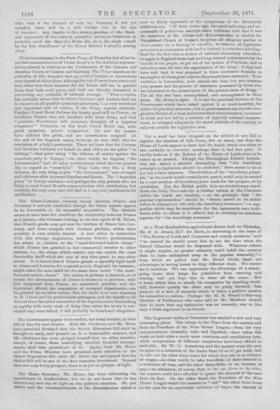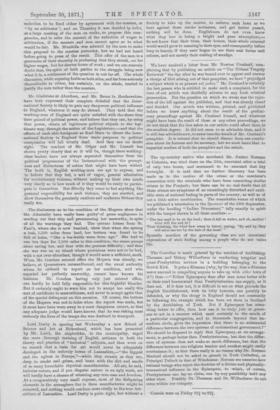The Engineers' strike at Newcastle has reached a new and
very interesting phase. The letters to the Times from the masters and from the President of the Nine Hours' League,—from the very commencement unusually calm and dignified,—have taken this week on both sides a much more courteous and conciliatory tone, while compromises of different complexion have been offered on each side. Sir W. G. Armstrong and the masters want the men to agree to a reduction of the hours from 69 to 57 per week, and to take out the other three hours for which they ask in an advance of wages,—in other words, to take two-fifths of their demand in • rr reduction of time, and the other three-fifths in an increase of pay,----an admission, of course, that, in time one form or the other, the masters could have afforded to grant the demand of the men from the first. On the other hand, the President of the Nine Hours' League wants the masters to " sell" the other three hours to 'the men for an equivalent reduction of wages,,the amount of 'reduction to be fixed either by agreement with the masters, or " by an arbitrator "; and on Thursday it was decided by ballot, at a large meeting of the men on strike, to propose this com- promise, and to refer the amount of the reduction of wages to arbitration, if the masters and men cannot agree as to what -would be fair. Mr. Mundella was selected by the men to make this proposal to the masters yesterday, but we had not heard before going to press of the result. This offer of the men is a guarantee of their sincerity in professing that they struck, not for 'higher wages, but for shorter hours of work ; and we can scarcely doubt that, the spirit of both parties to the struggle being now what it is, a settlement of the question is not far off. The whole discussion, while exposing faults on both sides, and far from seriously discreditable to either, has certainly, on the whole, tended to justify the men rather than the masters.































 Previous page
Previous page